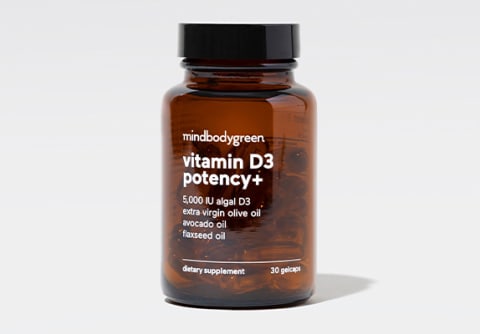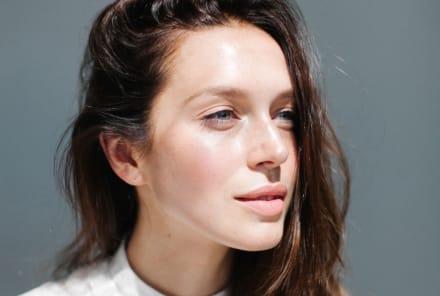Advertisement
Breaking It Down: The Best Sources, Foods & Supplements For Vegan Vitamin D


Ashley Jordan Ferira, Ph.D., RDN is Vice President of Scientific Affairs at mindbodygreen. She received her bachelor's degree in Biological Basis of Behavior from the University of Pennsylvania and Ph.D. in Foods and Nutrition from the University of Georgia.
As a vegan, you often face nosy people questioning your choices and asking about your health (yes, I'm getting enough protein, thank you very much).
Whether for ethical, health, or sustainability concerns, we respect your decision to follow this lifestyle and honestly just want to help you live your best life—which involves making sure you're getting enough vitamin D.
You probably already know about the massive problem that is vitamin D deficiency, but just to reiterate, 93% of U.S. adults1 aren't even getting 400 IU of vitamin D on a daily basis, which is already drastically lower than the dose needed to achieve and maintain sufficient vitamin D levels in your body, aka your vitamin D status (more on that later).
Given that 41% of American adults2 are insufficient in D (and 29% are straight-up deficient) per blood test results and the top sources of vitamin D are cod liver oil and beef liver (eeek), people who follow a vegan diet have to be extra intentional about their vitamin D intake.
With the right knowledge and a high-quality supplement on hand, keeping your plant-powered body pumped full of enough vitamin D is totally doable.
Here's how to get enough vitamin D when you're proudly plant-based—from both vegan foods with vitamin D2 and high-quality vegan vitamin D supplementation.
Why we need vitamin D.
Even though we're all (carnivores and herbivores, alike) kind of in the same boat when it comes to not getting enough vitamin D, the prevalence of this widespread issue doesn't make it less of a big deal.
This essential, fat-soluble vitamin is critical for proper calcium and phosphorus balance, musculoskeletal health, thyroid function, insulin secretion, blood pressure regulation, cell differentiation, and more.*
Regular and meaningful vitamin D intake—from food, sunshine, and proper supplementation—can support the gut microbiome, encourage healthy muscle function, promote a healthy pregnancy3, and bolster deep, restful sleep.* Without enough vitamin D, you can experience suboptimal bone health, low mood, less immune resilience, brain fog, and higher oxidative stress.*
With a hand in so many different functions in the body, you can see why vitamin D is a vital part of holistic health conversations at mbg.
Vegan sources of vitamin D.
Most sources of vitamin D are animal-derived, but there are still a few ways for plant-based individuals to obtain vitamin D from vegan foods and nature. Some vegan sources of vitamin D include:
- UV-treated mushrooms: Mushrooms actually have a cholesterol-like vitamin D precursor compound (ergosterol) in their under gills (i.e., those thin, bladelike structures under their caps), similar to the compound found in human skin (7-dehydrocholesterol). When turned upside down and exposed to sunlight or certain wavelengths of UV light, these pre-vitamin D compounds enhance mushrooms' vitamin D2 (ergocalciferol) content4, integrative gut health dietitians, plant-based experts, and co-founders of Married to Health Dahlia Marin, RDN, L.D., and James Marin, R.D., E.N., share.
- Fortified food: Plant-based milks, cereal, and tofu are often fortified (albeit with small amounts) with vitamin D2 from yeast.
- Sunshine: There's a reason D is nicknamed "the sunshine vitamin"! Indeed, we get some vitamin D3 from the sun via cutaneous (skin) synthesis, but this process is a lot more complicated (and less efficient) than you might think. It comes with both challenges and risks.
Unfortunately, you can't depend on any of these sources to provide you with adequate amounts of this essential micronutrient day in and day out. Even getting vitamin D from the sun is hard. You have to be aware of season, location (latitude), time of day, minimal erythema dose (MED), and a list of other complicated factors (including age, skin tone, and highly encouraged SPF skin protection).
"While we are huge fans of obtaining vitamin D from food sources and the sun, studies show that many American adults have suboptimal vitamin D levels, so supplementation is a great way to ensure levels are sufficient—with sunlight and foods providing an extra bonus,"* the Married to Health team tells mbg.
The experts all agree: The only way to achieve sufficient levels of vitamin D on a regular basis (daily, in fact, is the goal) is through supplementation.*
D3 versus D2.
There are two main types of vitamin D you can consume: D2 (ergocalciferol) and D3 (cholecalciferol). Generally, foods rich in D3 come from animals. These include cod liver oil, trout, salmon, and egg yolks. Sources of D2 are usually plant-derived and are sadly few and far between (as you can see from the list of vegan food sources above).
When aiming to up your vitamin D levels, vitamin D3 is 87% more effective5 at raising and maintaining those levels than D2.* As mbg's vice president of scientific affairs, Ashley Jordan Ferira, Ph.D., RDN, shares, the totality of science is clear: D2 just isn't suitable for supplementation when compared to the superior stability, bioefficacy, and bioactivity of D3.*
When looking for a vegan vitamin-D3-sourced supplement, be sure to check the source. Many supplements source their D3 from lanolin, which is a high-quality source but is derived from sheep's wool (for you vegan-minded folks). However, vegan D supplements will source their vitamin D from mushrooms (remember, that's the inferior D2 form). On the rare occasion, an innovative product will provide you with D3 from algae or lichen.
From a purity and sustainability standpoint, we are definitely pro-algae (read more about Ferira's take on lichen's less-than-sustainable practices here). "The unicorn of vegan D sources comes from sustainable, organic algae," concludes Ferira.
How much vitamin D do I need?
I think we can all agree that "thriving" is how we want to describe our health and wellness. There's a big difference between simply avoiding vitamin D insufficiency (aka survival) and striving for thriving levels—and unfortunately, clinical "sufficiency" is defined by the former.
Vitamin D serum levels, aka 25(OH)D, are measured in ng/mL when your health care provider measures them (i.e., blood test). In order to achieve the clinical definition (cutoff) of vitamin D sufficiency, which is 30 ng/mL, you need at least 3,000 IU of vitamin D3 per day, and this level of D isn't even enough.
As Ferira is quick to point out, "This vitamin D math presupposes certain baseline assumptions about body composition. According to clinical research, folks with overweight or obesity need two to three times more vitamin D input to impact serum D levels in the same manner."
Furthermore, Ferira and other nutrition experts believe this 30 ng/mL cutoff level is not something to strive for but rather should be avoided with intention. Guided by science and the professional expertise of health care practitioners, mbg believes that the true 25(OH)D serum level goal is 50 ng/mL.
Targeting and supporting this optimal level daily has an enormous impact on all aspects of human health—including immune and bone health, says board-certified endocrinologist Brittany Henderson, M.D.* That said, 5,000 IU per day is an efficacious dose to achieve this and an appropriate amount for the average person to take in order to achieve sufficient vitamin D status.*
What to look for in a vitamin D supplement.
So I know I need a vitamin D supplement, but how do I find one that's both effective and vegan? To make it super easy for you, this list is exactly what to look for when choosing a vegan vitamin D supplement.
- Ideally D3 (cholecalciferol) sourced instead of D2 (ergocalciferol) due to it being two to three times more effective.
- Sourced from sustainably grown, high-quality organic algae (lichen is another vegan source, but we believe algae is the more sustainable and effective choice)
- A dosage greater than 2,000 IU (with bonus points for those at an efficacious dose of 5,000 IU) if it's a stand-alone vitamin D supplement. If it's a multi-ingredient formula, like an immune complex or multivitamin, look for 1,000 IU and higher doses in terms of useful D amounts.
- Added fats: Because vitamin D is an essential, fat-soluble vitamin that needs to be consumed alongside some fat in order to be absorbed optimally, vitamin D carried in an oil is particularly effective6. For vitamin D in a capsule, powder, or tablet, make sure to consume it around the time of a meal. That's why integrative registered dietitian Whitney Crouch, RDN, CLT, advises taking your vitamin D with a fat-containing food if your supplement doesn’t already contain built-in fats (oils).
- Contains only vegan ingredients: Check the label to ensure the supplement doesn't contain animal products in its capsule or other ingredients. A vegan claim on a label from a trusted brand can be an easy way to ensure the product aligns with your lifestyle.
If you're strictly vegan, you'll find all of the above boxes ticked in mbg's ultimate multivitamin+, a vegan multi for women and men with a truly comprehensive (33 active ingredients) and clean formula, boasting 14 vitamins (including 2,000 IU of organic, algal D3), 13 minerals, and 6 botanical bioactives for whole-body health and longevity.*
And for those individuals who are mostly plant-based but don't follow a strictly vegan diet, consider mbg's vitamin D3 potency+ for your stand-alone go-to daily D supplement. This powerhouse, innovative formula utilizes D3 sourced from organic algal oil and pairs it with a blend of three organic, virgin oils (flaxseed, avocado, and extra-virgin olive) for built-in absorption technology.* The gelcap (high-quality bovine gelatin) is what makes this product technically not vegan. To read more on why we didn't choose a vegan gelcap for this formula (hint: ingredient stability and porosity issues), check this out.
The bottom line.
When you follow any kind of specific diet, you have to be even more intentional about your nutrient intake. In a vegan diet, those nutrients include protein, iron, vitamin B12, iodine, and especially vitamin D. To name a few heavy hitters.
And if you look at the scientific evidence and ask the experts, they all tend to agree—supplementation is the most effective way to get the necessary amount of vitamin D to achieve healthy vitamin D status for your bone, muscles, brain, gut, etc. (shall I go on?).*
Proper intake of this MVP micronutrient vitamin D is critical to a thriving body and mind.* And what could be more important than taking care of your whole-body health so that you can get back to saving the animals, saving the planet, and veganizing every recipe that comes to mind?
With our simple list of criteria, you'll be able to find a premium, clean supplement that supports healthy D levels, aligns with your lifestyle, and pairs perfectly with your oat milk latte.*
6 Sources
- https://www.ncbi.nlm.nih.gov/pmc/articles/PMC5579642/
- https://www.cambridge.org/core/journals/british-journal-of-nutrition/article/vitamin-d-deficiency-and-insufficiency-among-us-adults-prevalence-predictors-and-clinical-implications/44E436843510FE6BDE856D5BCB9C651F
- https://pubmed.ncbi.nlm.nih.gov/31669079/
- https://www.ncbi.nlm.nih.gov/pmc/articles/PMC6213178/
- https://www.ncbi.nlm.nih.gov/pmc/articles/PMC3349454/
- https://www.ncbi.nlm.nih.gov/pmc/articles/PMC3033429/
Watch Next
Enjoy some of our favorite clips from classes
Enjoy some of our favorite clips from classes
What Is Meditation?
Mindfulness/Spirituality | Light Watkins
Box Breathing
Mindfulness/Spirituality | Gwen Dittmar
What Breathwork Can Address
Mindfulness/Spirituality | Gwen Dittmar
The 8 Limbs of Yoga - What is Asana?
Yoga | Caley Alyssa
Two Standing Postures to Open Up Tight Hips
Yoga | Caley Alyssa
How Plants Can Optimize Athletic Performance
Nutrition | Rich Roll
What to Eat Before a Workout
Nutrition | Rich Roll
How Ayurveda Helps Us Navigate Modern Life
Nutrition | Sahara Rose
Messages About Love & Relationships
Love & Relationships | Esther Perel
Love Languages
Love & Relationships | Esther Perel
What Is Meditation?
Box Breathing
What Breathwork Can Address
The 8 Limbs of Yoga - What is Asana?
Two Standing Postures to Open Up Tight Hips
How Plants Can Optimize Athletic Performance
What to Eat Before a Workout
How Ayurveda Helps Us Navigate Modern Life
Messages About Love & Relationships
Love Languages
Advertisement

This Little-Known Supplement Helps Women Sleep & Decreases Signs Of Depression
Molly Knudsen, M.S., RDN

This Little-Known Supplement Helps Women Sleep & Decreases Signs Of Depression
Molly Knudsen, M.S., RDN
















